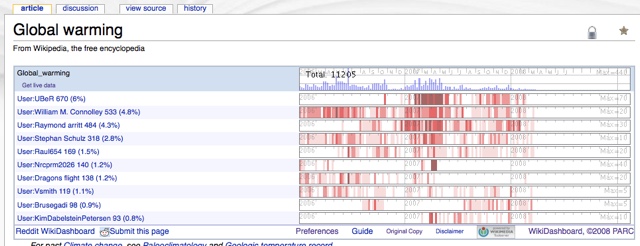Nicolson Baker has written a lovely piece about Wikipedia in which, as usual, he makes fascinating use of his own compulsiveness. Excerpt:
It was constructed, in less than eight years, by strangers who disagreed about all kinds of things but who were drawn to a shared, not-for-profit purpose. They were drawn because for a work of reference Wikipedia seemed unusually humble. It asked for help, and when it did, it used a particularly affecting word: “stub.” At the bottom of a short article about something, it would say, “This article about X is a stub. You can help Wikipedia by expanding it.” And you’d think: That poor sad stub: I will help. Not right now, because I’m writing a book, but someday, yes, I will try to help.
And when people did help they were given a flattering name. They weren’t called “Wikipedia’s little helpers,” they were called “editors.” It was like a giant community leaf-raking project in which everyone was called a groundskeeper. Some brought very fancy professional metal rakes, or even back-mounted leaf-blowing systems, and some were just kids thrashing away with the sides of their feet or stuffing handfuls in the pockets of their sweatshirts, but all the leaves they brought to the pile were appreciated. And the pile grew and everyone jumped up and down in it having a wonderful time. And it grew some more, and it became the biggest leaf pile anyone had ever seen anywhere, a world wonder. And then self-promoted leaf-pile guards appeared, doubters and deprecators who would look askance at your proffered handful and shake their heads, saying that your leaves were too crumpled or too slimy or too common, throwing them to the side. And that was too bad. The people who guarded the leaf pile this way were called “deletionists.”
Well worth reading in full. Pour some coffee, pull up a chair, and enjoy.
Update: TechCrunch is reporting that
The ten millionth article has been written on Wikipedia – a Hungarian biography of of 16th century painter Nicholas Hilliard.
Never heard of him — until now. That’s Wikipedia for you.

